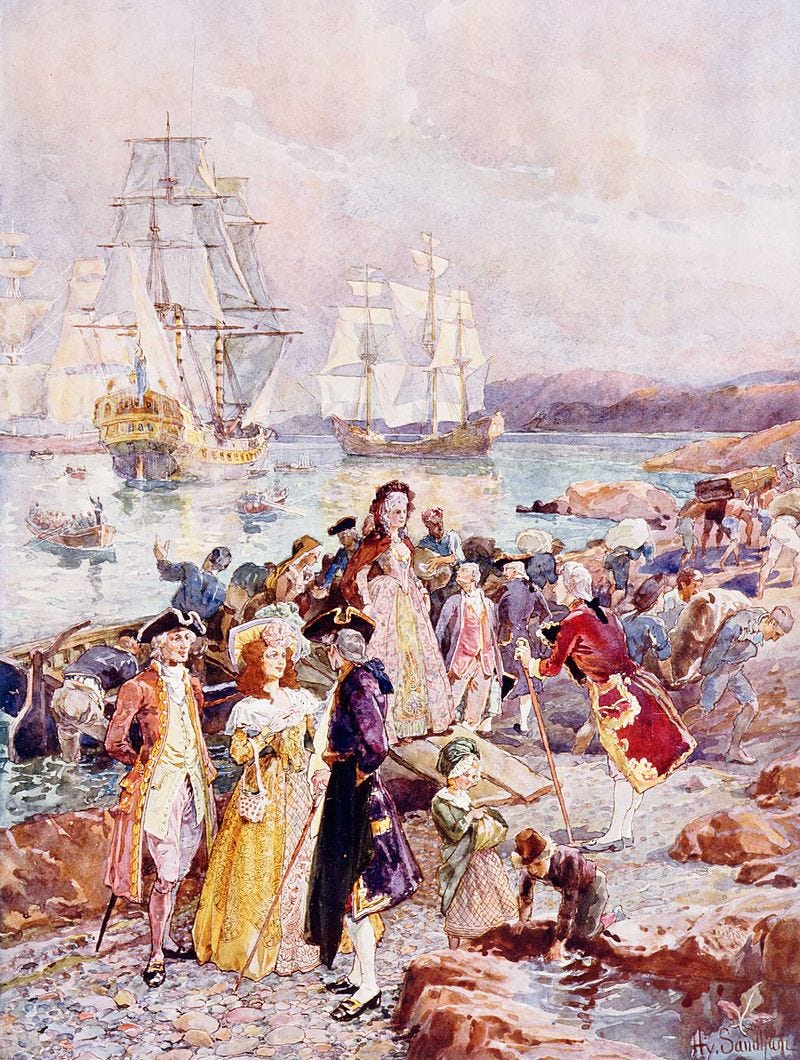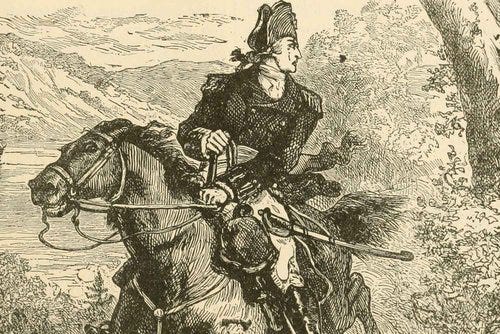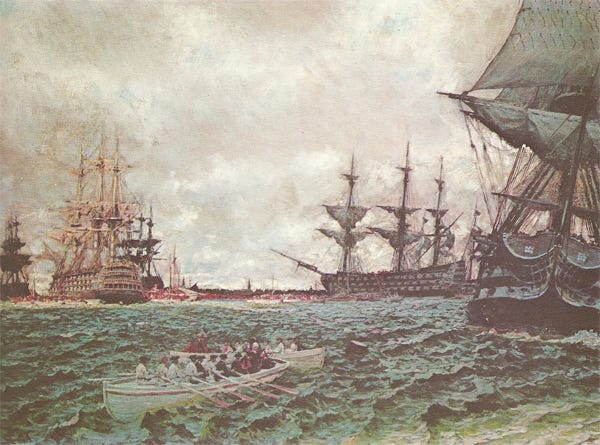One of the aspects of my family history that is not as familiar for me is my New Brunswick heritage. We have a handful of stories in our family about it. My great-grandfather David Thomson was, of course, the man who made New Brunswick sing. My grandmother, David’s daughter Ruth, babysat that famous New Brunswicker, the late, great Donald Sutherland. (That’s something that I bring up anytime I watch a Donald Sutherland movie.) I’d love to track down some more detail on that — how did his family hear about her? Did she impart any dramatical wisdom to him — or even inspire him to embark upon the career that made his name?1

But, actually, our family has fairly deep roots in New Brunswick. My grandmother was born there in 1924 and stayed in the province until 1948 when she moved to Toronto to commence post-graduate training in public health nursing at the University of Toronto.2 Her mother, Rhea Bissett, was born in Saint John (in 1895), as were her grandparents, Henry Havelock Bissett and Minnie Cindora Bissett (née Huggard), as were their parents (Andrew Bissett / Sarah James and George Huggard / Adelia Barnes), and even some of their grandparents, with our earliest relatives arriving in what would later become the province in the 1770s.3
And, with the exception of just a couple of these first New Brunswick ancestors, all of them had something in common…
United Empire Loyalists
I’ve known for a long time about the American roots of my New Brunswick ancestors. I also knew that there was a connection between my ancestors and those who fought on the side of the British during the American Revolutionary War, a.k.a. the War of Independence.
For instance, Andrew Bissett (Sr.) was thirty when he joined the 76th Regiment of Foot in his native Scotland and sailed across the Atlantic to fight the American rebels. It was 1779. America had declared its independence three years earlier, but the Revolutionary War itself was only halfway complete. His wife, Anne, and seven-year-old son, William, stayed behind in Aberdeenshire.
By 1781, he was dead, his regiment having been captured after the disastrous Siege of Yorktown and taken to Camp Security in Pennsylvania, where he succumbed most likely to the effects of the malaria that had already incapacitated as many as half of the British army. In 1804, after immigrating to New Brunswick, his son married a woman from there, Elizabeth Weldon (although she too was a descendant of a family that had fought for the losing side of the war).
I hope eventually to dig deeper into Andrew’s tragic story, but I had not realized how deeply New Brunswick and the history of the Loyalists are intertwined. I also had not realized how much my grandmother’s family hinged on this historical moment: the mass emigration of the United Empire Loyalists to New Brunswick through the 1770s and 1780s.

The United Empire Loyalists were Americans who resisted the revolution that swept across the colonies in 1776. For many of my ancestors, they had been living in North America for over a hundred years already. Coming over on such ships as the Lyon and the Matthew (among others) in the 1630s and 1640s, these families had arrived in places like Connecticut and New York and put down roots.45
130 years later, the sentiments of many Americans had fully turned against Britain and their king — but not all Americans! For whatever reason, my ancestors did not feel that these offences merited rebellion. Instead, they decided to defend the status quo. They quite possibly (and quite likely) didn’t agree with the taxation and other decisions that had led their fellow citizens to call for revolutionary change. Nevertheless, when the citizens of these thirteen colonies took up arms, it was my family members who tried to put them down.
There is a distinct lack of information — itself discussed by many of the sources I’ve come across in this research — on the Loyalists in general. “History is written by the victors,” is a truism that is exemplified vividly here. It makes sense: unlike the Patriots, who had a vested interest not only in recording the day-by-day events of the Revolutionary War, but also in mythologizing the entire venture into a powerful origin narrative that continues to control the fate of many to this present day, the Loyalists came to this country with little besides the shame of defeat. They needed to start over anyways, so why dwell on things like this?
Loyalist Ancestors
These beleaguered refugees were people like Captain Joshua Barnes, my 6th-great-grandpa, who among several other adventures, appears to have fought alongside that famous turncoat, Benedict Arnold. (Note that this was after Arnold switched sides, his name becoming forever synonymous with treachery.) Barnes also fought for a time with Emmerick’s Chasseurs, a Loyalist regiment founded in 1777 and led by a German named Andreas Emmerick. Emmerick went on not only to survive the Revolutionary War, but also to write a book about guerrilla warfare and gain some fame in the Napoleonic Wars. He was shot in 1809 while attempting to kidnap the brother of Napoleon Bonaparte.

Barnes himself was morally murky. During the battle of Fort Montgomery, Barnes apparently told his men not to charge with the other groups, saving their lives but also endangering the lives of many others. He was eventually charged with cowardice. There’s a transcript of the trial. He was acquitted of both cowardice and stealing leather breeches from the rebel army. Reading the transcripts, it’s hard to understand how he could have been acquitted, though.
In fact, in general, it’s tough to read these stories. The world of the Revolution and afterwards is violent, chaotic, and yet also curiously modern. There’s a story of Barnes coming upon a “rebel” house and ordering his men to burn it to the ground. The rebel family living inside is able to get out, but the mother is frantic because her baby is still inside when the building gets engulfed. Fortunately, a “Hessian” (one of the German soldiers who fought alongside the British in the war) was able to get the baby out and restore it to its mother.
Another ancestor, Obadiah Akerley, was captured and imprisoned by the Patriots after he raised a troop of horse for the brigade of Col. James de Lancey. This was a massive force of 1500 men and horses led by a man who came to be known “Commander of the Cowboys” and “Outlaw of the Bronx.” When Ackerley’s role was discovered, the rebels took his furniture, cattle, clothes, and horses. He had to flee with his mother and brothers to New Brunswick. As he noted in his claim, he losses actually occurred a few days after the Revolution was declared to be over. He testified that “the people who took them came in the night were called Skinners.”6
One more Loyalist story. This time, it’s about an ancestor who was not from the north, but the south. Thomas Thornton was a farmer from a village called Ninety Six in South Carolina. He served in the Steven’s Creek militia under Captain Henry Rudolph and Colonel John Cotton, having joined with his brother in June 1780. Thornton was involved in several battles, including the brutal Battle of Kings Mountain, which one writer described as “the war’s largest all-American fight.” In a little over an hour, 318 people died (91% of whom fought on the side of the King), 223 were wounded altogether, and 668 of the Loyalists were taken prisoner. If you want an idea of how awful some of these battles were, check out the 2000 film, The Patriot, which is largely set in South Carolina.7
From April to December 1782, Thomas served as Captain in the Little River militia under Captain Thomas Pearson. Finally, he — along with thousands of others — fled to Nova Scotia during the evacuation of Charleston in December 1782. After thirty months of occupation but with the end in sight following the surrender of Cornwallis in October 1781, the British agreed not to destroy the city if they were permitted safe passage to evacuate, which they finally did on December 14. The escape was evidently an arduous one and, soon after he arrived in Nova Scotia with his three sons, Thomas died. He was 45 years old. His wife having died a few years earlier, Thomas left his young children, including my 6th-great-grandmother Susannah, to be raised by his fellow Loyalist, Reuben Lively, in Nova Scotia.

Mixed Feelings
Apparently, if you are the descendant of United Empire Loyalists, you are allowed to put “U.E.” as a post-nominal after your name.
Jeff King, U.E.
Honestly, I don’t know how I feel about that. Empire has certainly fallen out of vogue — and I say good riddance to it. To put myself in the place of one of these ancestors, though, I am not sure how I would have responded. I’ve always been a fan of the Queen — and King Charles often gets fondly referred to in our home as “the Wool King.” Monarchies obviously have all sorts of terrible legacies, yet I’m not sure that the alternatives have been proven out quite yet. I’d rather have a monarch clearly marked out with pomp and circumstance and very little actual power than an unlabelled one free to issue all manner of executive orders and with the power to bring the world to its knees.
Still, King George III was no Wool King. (As Jonathan Groff reminds us so hilariously!) So, maybe I would have thrown my lot in with the rebels.
Interestingly, to bring things full circle, this article describes how Donald Sutherland’s family came over from Scotland in the 1770s — not unlike my dearly departed 5th-great-grandfather Andrew Bissett — to fight in the Revolutionary War. That ancestor, Peter Sutherland, survived and settled in Nova Scotia, marrying the daughter of a Loyalist in 1793.
In other words, Donald Sutherland, U.E.
In 1940, Donald was 5 and my Grandma Ruth was 16. David and Rhea Thomson were living at 281 Princess Street. Frederick and Dorothy Sutherland (Donald’s parents) were down the block and around the corner at 237 Germain Street, a 13-minute walk. But how did they find out about Ruth in the first place? Did the families know each other? Fred was VP and General Manager of New Brunswick Power. David was the founder of the famous Carriden Choir and a regular on local radio. Perhaps they had met David at a performance of the Carriden Choir. Or maybe it was more simple. The Thomsons were long-time and very active members at Germain Street Baptist Church, located at 228 Germain Street, less than a block away from the Sutherland’s place. Maybe Grandma Ruth had simply put up a notice in the foyer that she was available for hire. I wonder what they paid?
A short notice in the Telegraph-Journal for October 6, 1948 describes the vacancy on the Saint John's Board of Health due to the “one year leave of absence [granted] to Miss Ruth Thomson, who will take a post-graduate course in public health nursing at the University of Toronto.” Note that, according to an article published in July 1949, Ruth did return home to New Brunswick that following year, rejoining the Board of Health. She remained in Saint John until 1951.
New Brunswick did not become its own province until 1784, having previously been part of Nova Scotia. Mere decades before this, it was the site of the massive and horrific Acadian deportation by the British, which occurred between 1755-1763.
The first member of the Barnes family appears to have been one Joshua Barnes (1616-1692), who was born in Norfolk in England and arrived in Boston sometime in September 1632 whereupon he was bound to a man named William Paine for five years. I am not certain what ship he came over on, but a ship arriving in Boston in mid-September 1632 called Lyon might fit the bill.
This excellent discussion about Henry Whitney, the earliest representative of my family’s Whitney line in America, indicates that Henry’s brother-in-law, William Salmon, is known to have come to America aboard the Matthew on May 21, 1635.
This may or may not have been the case. As one author suggests, the Skinners were militia-men not affiliated with the Continental Army. The author goes so far as to argue that they were in fact a British militia.
That being said, it was directed by Mel Gibson, so quite possibly what it depicts was more violent than reality. Nevertheless, I have seen claims that the war in the south was especially brutal.




